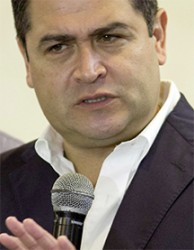TEGUCIGALPA, (Reuters) – Honduras’ conservative ruling party candidate, Juan Hernandez, has won Sunday’s presidential election after campaigning on a promise to tame rampant drug gang violence that has given the struggling nation the world’s highest murder rate.

Results showed the head of Congress beating his leftist challenger, Xiomara Castro, wife of ousted former leader Manuel Zelaya, thereby ensuring continuity of outgoing President Porfirio Lobo’s right-leaning economic policies.
A Hernandez victory snuffs out Zelaya’s immediate hopes for a comeback to the main stage after he was deposed in a 2009 coup, which plunged the Central American country into deep crisis and turned Honduras into an international pariah.
Castro cried foul, denouncing fraud and refusing to accept the results, setting the stage for a protracted conflict. But the electoral authority said on Monday that Hernandez had an “irreversible” lead.
Hernandez, 45, who was known as the “Dauphin” for his close links to Lobo, took 34.08 percent of the vote, with Castro trailing on 28.92 percent, results showed with 67.75 percent of poll booths counted.
Lobo is barred by law from seeking a second term.
Hernandez has repeatedly vowed to “do whatever it takes” to curb violence that has saddled Honduras with an annual murder rate of more than 85 per 100,000 inhabitants – at a time when public debt is mounting and the economy is stumbling.
In Congress, he oversaw a reform to allow the extradition of Hondurans involved in organized crime to the United States, and rolled out a militarized police force to reclaim control of a nation of 8.5 million people where 20 are killed every day.
Hernandez now plans to beef up the force to battle the rampant drug cartel violence alongside the army. “It’s the outcome the investors and the business community want. He’ll probably continue to sell off state assets, but his hands are going to be to be tied by the fiscal situation,” said Daniel Sachs, an analyst at consultancy Control Risks.
But Sachs said there was unlikely to be a quick fix to violence, which has been bred by feuds between rival gangs seeking to move South American cocaine to the United States, often abetted by Honduras’ corrupt police force.
“Nothing is going to change until they go after the root causes, which are poverty, social inequality, an endless supply of arms, and the low tax take,” Sachs added. Hernandez also faces a hard struggle to drive investment to a country that is the biggest coffee exporter in Central America but has been shunned by foreign investors and is controlled by a tight-knit group of business elites.
ECONOMIC FEARS
Annual growth is expected to slow to below 3 percent this year, from 3.3 percent in 2012, while the fiscal deficit is tipped to exceed 7 percent of gross domestic product (GDP).
The impact of fungus roya, or leaf rust, on large swaths of the country’s coffee crop will likely raise pressure on a yawning current account deficit the International Monetary Fund projects will be 11.2 percent of GDP this year.
“The economy is screwed. You have no idea how screwed it is,” said 31-year-old Nidia Hernandez, who works as a shop assistant in the capital, Tegucigalpa. A roughly $200 million IMF credit deal expired in March 2012 after Lobo’s government failed to meet consolidation targets. Experts say the IMF was unwilling to throw good money after bad before a presidential election.
Hernandez says he disagrees with the IMF on various issues but hopes to cut a new credit deal within six months.
For 120 years, Honduran politics were dominated by just two parties – the National Party and the Liberal Party – alongside intermittent periods of military rule.
But the political landscape was reshaped by the advent of Castro’s Liberty and Refoundation Party, or LIBRE – a coalition of leftists, unions and indigenous groups founded by Zelaya.
With no clear majority expected in Congress, Hernandez is likely have to make concessions to rivals as he seeks to combat the drug gangs and shore up the Honduran state finances.
He says he wants to emulate Colombia’s successes in curbing violence, and avoid the example of Mexico, where some 80,000 people have been killed since the last government launched a military offensive against drug cartels at the start of 2007. “I believe whoever gets involved in crime should be put in their place by the state,” Hernandez said last week.
Violence has been climbing steadily in Honduras over the past decade, and began a sharp rise as Mexican gangs moved into the country during the crackdown on their own turf.
Zelaya was forced to confront that challenge before he was roused from his bed and ejected from Honduras in 2009.
Having taken power in 2006 as a conservative, Zelaya moved to the left under the influence of the late Venezuelan leader Hugo Chavez. When he explored amending the constitution, his opponents interpreted it as a bid to seek a second term.
The Supreme Court ordered Zelaya’s ouster and the army quickly expelled him from the country. Honduras’ Congress endorsed his removal but U.S. President Barack Obama and other foreign leaders denounced it as a coup.
The U.S. ambassador to Honduras and the head of the European Union’s election observers said Sunday’s voting was clean and urged participants to respect the results.
Zelaya and Castro remained defiant.
“We are going to defend our triumph at the ballot box and if necessary will take to the streets,” Zelaya said. “Until proven otherwise, we hold triumph in our hands.”
“We will seek a recount ballot box by ballot box, booth by booth, town by town,” Zelaya added. “We are struggling against an oligarchy in the government of Honduras





